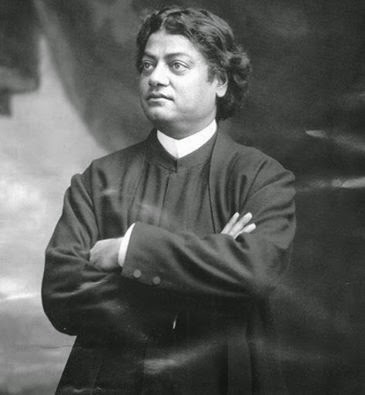VEDIC RELIGIOUS IDEALS : 7.
Along with this progress of spiritual ideas that I am trying to trace for you, I can only hint to you a little about the other factor in the growth, for that has nothing to do with our subject, therefore I need not enlarge upon it — the growth of rituals. As those spiritual ideas progressed in arithmetical progression, so the ritualistic ideas progressed in geometrical progression. The old superstitions had by this time developed into a tremendous mass of rituals, which grew and grew till it almost killed the Hindu life And it is still there, it has got hold of and permeated every portion of our life and made us born slaves. Yet, at the same time, we find a fight against this advance of ritual from the very earliest days. The one objection raised there is this, that love for ceremonials, dressing at certain times, eating in a certain way, and shows and mummeries of religion like these are only external religion, because you are satisfied with the senses and do not want to go beyond them. This is a tremendous difficulty with us, with every human being. At best when we want to hear of spiritual things our standard is the senses; or a man hears things about philosophy, and God, and transcendental things, and after hearing about them for days, he asks: After all, how much money will they bring, how much sense-enjoyment will they bring? For his enjoyment is only in the senses, quite naturally. But that satisfaction in the senses, says our sage, is one of the causes which have spread the veil between truth and ourselves. Devotion to ceremonials, satisfaction in the senses, and forming various theories, have drawn a veil between ourselves and truth. This is another great landmark, and we shall have to trace this ideal to the end, and see how it developed later on into that wonderful theory of Mâyâ of the Vedanta, how this veil will be the real explanation of the Vedanta, how the truth was there all the time, it was only this veil that had covered it.
Thus we find that the minds of these ancient Aryan thinkers had begun a new theme. They found out that in the external world no search would give an answer to their question. They might seek in the external world for ages, but there would be no answer to their questions. So they fell back upon this other method; and according to this, they were taught that these desires of the senses, desires for ceremonials and externalities have caused a veil to come between themselves and the truth, and that this cannot be removed by any ceremonial. They had to fall back on their own minds, and analyse the mind to find the truth in themselves. The outside world failed and they turned back upon the inside world, and then it became the real philosophy of the Vedanta; from here the Vedanta philosophy begins. It is the foundation-stone of Vedanta philosophy. As we go on, we find that all its inquiries are inside. From the very outset they seemed to declare — look not for the truth in any religion; it is here in the human soul, the miracle of all miracles in the human soul, the emporium of all knowledge, the mine of all existence — seek here. What is not here cannot be there. And they found out step by step that that which is external is but a dull reflection at best of that which is inside. We shall see how they took, as it were, this old idea of God, the Governor of the universe, who is external to the universe, and first put Him inside the universe. He is not a God outside, but He is inside; and they took Him from there into their own hearts. Here He is in the heart of man, the Soul of our souls, the Reality in us.
Swami Vivekananda
To be continued ....




Comments
Post a Comment